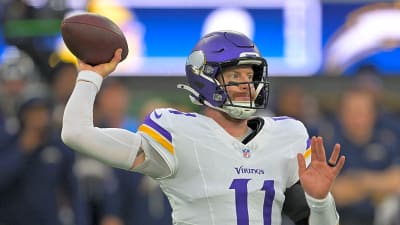
Carson Wentz took a thorough beating on Thursday night in Los Angeles. He was officially sacked five times in the Vikings' embarrassing 37-10 loss to the Chargers, but he was hit and pressured on numerous other plays. Wentz, who came into the game nursing a left shoulder injury and wearing a large protective brace, was visibly in pain — and sometimes substantial amounts of it — after hitting the turf.
Late in the fourth quarter, with the Vikings down by 24, Wentz's combination of physical pain and frustration over a rough night boiled over. After he took yet another hit on a fourth down, landing on his hurt shoulder, the Prime Video broadcast showed him in agony as he lay on the ground.
"Boy that sums it up, doesn't it?" remarked veteran play-by-play man Al Michaels. "That one picture."
After a commercial break, the broadcast showed footage of Wentz leaving the field, throwing his helmet on the sideline, and taking a seat on the bench with tears welled up in his eyes (color commentator Kirk Herbstreit bizarrely criticized him for that display of emotion, but that's another story).
"Yeah, I'm not proud of that," Wentz said after the game. "I apologize to the equipment guys for that one. But yeah, I was in a good amount of pain there."
Over the course of the night, the amount of physical punishment inflicted on the Vikings' quarterback reached a point where, if this had been a boxing match, the ref might've stopped the fight. In this situation, the two main people with the power to remove Wentz from the game were Wentz himself and head coach Kevin O'Connell.
Neither one made that call. On a night where Wentz was under constant duress and could get nothing going, the decision was never made to go to rookie backup Max Brosmer until one final garbage time drive with two minutes to play.
"We kept on checking in, maybe getting Max ready to go," O'Connell said. "Carson was sore going into it. He took obviously quite a few hits. I asked him multiple times where he was at and he said he was good and wanted to keep going."
"Pain is pain," Wentz said. "I felt like I could still help this team and find a way to go down and score. That's the tough part about Thursday night games, you just don't quite get the chance to recover. But that's no excuse, by any means. When I'm playing out there, I felt fine."
It shouldn't come as a surprise that Wentz didn't want to take himself out of the game. After all, elite professional athletes are intense competitors. The larger context of the situation is also relevant. Wentz was making his fifth and likely final start in place of Vikings QB1 J.J. McCarthy, who is expected to return from an ankle injury two Sundays from now in Detroit. Wentz knew that, so of course he wanted to play through the pain and continue to compete.
O'Connell should've been the one to step in and save Wentz from himself. The Vikings' head coach has previously talked about protecting injured players from themselves and doing what's in their best interest. In this case, the call should've been made to take Wentz out of the game much earlier. It didn't do anyone any good to keep trotting him out in a blowout loss, given the amount of pain he was clearly in over the course of the night.
Just feel awful for Carson Wentz on a human level.
— Will Ragatz (@WillRagatz) October 24, 2025
It feels legitimately irresponsible that he was allowed to play almost the entire game. pic.twitter.com/FQwdQY4NoC
Even if Wentz didn't aggravate his shoulder injury, he certainly felt the ache of going through the football equivalent of several car crashes. And beyond protecting Wentz from himself, there was also an argument to give Brosmer an opportunity from a competitive standpoint. Wentz held onto the ball too long numerous times behind a banged-up offensive line and eventually threw an ugly interception in the fourth quarter. Could Brosmer not have attempted some quick passes and perhaps provided a spark?
In his postgame press conference, O'Connell had a couple different explanations for the decision to stick with Wentz. The first was that he didn't want to put Brosmer into that kind of situation in what would've been his first meaningful NFL action.
"Carson's a veteran player," O'Connell said. "He understands some of our circumstances tonight. I think it's very difficult to ask a rookie to go in there for his first performance and have to be weathering it a little bit for the group. I did think about (putting him in) at different times in the game. The confidence we have in Max, the upside we see in Max is real, we just — you also don't want to send him out there and force a level of figure-it-out-ness that's probably beyond a guy playing for the first time. That was where the decision was to continue to go with Carson as long as Carson felt like he was healthy enough to keep playing and the medical team did as well."
The other explanation was that O'Connell felt like he had to give Wentz, as a veteran player, the opportunity to continue to battle if that's what he wanted to do.
"When a guy like that, a veteran guy, that's in there competing, you have to value that," he said. "As long as the medical team informs me, which they did a couple times, that he's no worse than what he came into the game with, you've gotta give a guy, that wants to toe the line and go in there, you've gotta give him a chance to do that. Until it becomes 'he can't do his job.'"
O'Connell then followed that up by saying he thought Wentz's injury might've affected his badly air-mailed interception, which feels a little bit contradictory. Wentz said he didn't think the shoulder impacted his performance.
Either way, O'Connell's argument that he was obligated to let Wentz continue to play feels questionable. The argument about not wanting to put Brosmer into difficult circumstances has a bit more strength, but that one can be questioned as well. At 24, Brosmer is two years older than McCarthy, and seemingly capable of getting rid of the ball quickly within the Vikings' offense. O'Connell and others have regularly praised Brosmer for his football intelligence and command of their scheme.
The bottom line is that this reached a point where Wentz, for his own good, should no longer have been allowed to continue playing. Brosmer should've come into the game at least one possession earlier than he did, if not several. It almost certainly wouldn't have made a difference in the outcome, but it would've at least saved Wentz from some extreme pain and humiliation.
I have seen boxing matches stopped with less punishment then what Wentz is enduring. Why is KOC refusing to let Brosmer throw some short passes?
— Mark Rosen (@KFANRosen) October 24, 2025
I think Wentz has a lawsuit on his hands. This is malpractice
— Justin Gaard (@Gaardsy) October 24, 2025
I just don’t understand how it benefits anybody to throw a hurt Carson Wentz out there in a 24-point game.
— Sam Ekstrom (@SamEkstrom) October 24, 2025
More from Vikings On SI
More must-reads:
- Why this potential Cowboys-Dolphins trade makes plenty of sense
- Pros and cons of a potential Brian Thomas Jr. trade for Jaguars
- The 'Active 3-passing-TD game leaders' quiz
Breaking News
Trending News
Customize Your Newsletter
 +
+
Get the latest news and rumors, customized to your favorite sports and teams. Emailed daily. Always free!








